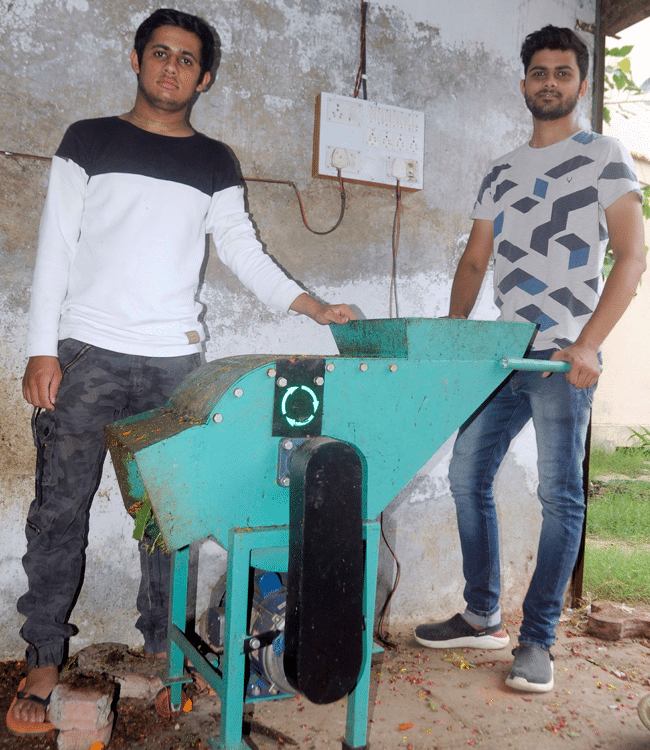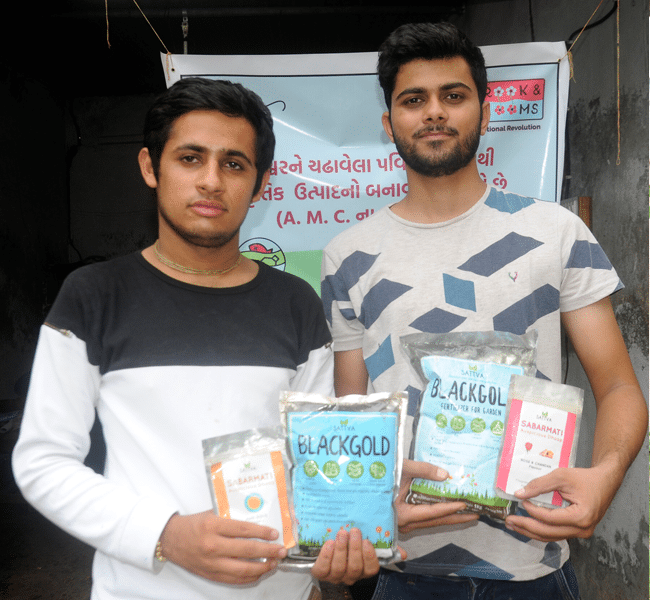Flowers are a very significant aspect of religious practice in Hinduism and no puja is complete without their use. Devotees cover their deities with multiple colored blossoms, offer fruits, a piece of cloth or “chunri” because religious sentiments are attached to them. However after the rituals are performed, they dump these offerings in rivers or in dustbins, leading to environmental pollution.
In conversation with Life Beyond Numbers, this young engineer duo of Arjun Thakkar (21) and Yash Bhatt (21) talked about their mission to make India pollution free with a simple initiative of turning temple waste into organic manure. Both hail from Harij Gaon in Gujarat and mechanical engineers from Silver Oak Engineering College. It was Yash, who got the idea of doing something about the waste that is generated from temples- recycle flowers, save aquatic life and reduce pollution.

In 2015, after attending a lecture at Gujarat Technological University (GTU), how an engineer should be accountable enough to look after societal problems, Yash and Arjun came up with the idea of converting temple waste to organic manure. They sent their proposal to AMC (Ahmedabad Municipal Corporation), which got approved later. Their pilot project was funded by GTU’s innovation council, who gave them a grant of Rs 95,000, which helped them to start their wonderful initiative in collaboration with AMC through the Kalash Project.
While doing their research on waste management, they found even though the machine converts 1-tonne waste in an hour, the organic manure was full of contamination. Arjun says, “We figured out that the final product had foreign particles like pieces of clothes and plastics. Therefore, we decided to incorporate changes in the machines so that after processing waste we get pure organic manure only.”
After giving this initiative a lot of thought, the duo decided to segregate flower and leaf waste from the rest and process it through vermicompost, but the process was elaborate and was hardly time and energy efficient as it took 40-45 days depending on the worms and seasons. The machines they developed was semi-automatic and could process 100 kgs of waste in an hour and in 15 days, the organic manure was ready to use.
“Nowadays we use a lot of artificial products while performing the rituals to show our love to God but we need to realize that “Bhagwan nehi aata, sirf Pollution aata hain.” (God doesn’t appear, but pollution does),” says Arjun.
“There are more than 2000 temples in Ahmedabad and our mission is to convert discarded flowers from those temples into organic manure,” says Yash.
Currently, Yash and Arjun are working with 25 temples and their target is taking into account 50 temples primarily. The duo now sells their product under a registered brand- “Brook and Blooms” and this year on August 30, the inauguration was done in Shree Kalyan Pushti Mandir. Because of their wonderful initiative, now about 25000 kgs of waste are processed from 25 temples to get 250-300 kgs of organic manure.

“Our machines can process 100kg waste in an hour and we are working to increase its efficiency. We now have two semi-automatic machines and two fully automatic machines from AMC that are processing the waste,” says Arjun.
“Even though the organic manure we make is not fit for agriculture, but it is perfect for home gardening. These are rich in nitrogen phosphorous and therefore it is one of the best quality manure for plants.“
In Jain temples, usually rose flowers are used for prayers and other rituals and therefore the duo now is planning to make rose water out of it that will be completely herbal. Not just that, Yash and Arjun are planning to manufacture herbal incense cones, which will be made from waste flowers in temples. “We are planning to use Rose and Gerbera flowers from temples to make herbal incense cones,” says Arjun.
“When you light an incense stick which contains charcoal, it is similar to smoking more than 4 cigarettes a day. People use it during rituals without knowing that their health is also getting affected in the process and it is high time that we should switch to herbal ones.”
Same with Hawans in the temple, the rituals are done in good faith but in reality, this also contributes to environmental pollution. Therefore, the duo is making products using cow dung that won’t be contributing to the pollution every time you do a puja.
“Most of the time, be it flowers, leaves or fruits- whatever it is, after the puja is done, people throw it in the river. It pollutes the water bodies and the aquatic life gets affected because of the plastic materials we use during rituals and the flowers we use while pujas contain pesticides. Instead what we can do with that waste is bury it in the soil or use them in our flower pots. After 50-60 days, it will become organic manure which will be eco-friendly as well and the best part is you won‘t have to spend a single penny for that,” he adds.
“We wanted to minimize waste as much as possible and create something new from it. It is like showing gratitude to nature and giving it back to nature what once belonged to her.“
Pollution from flowers is constantly overlooked in policy-making and the chemicals that these flowers carry are slowly destroying the marine life.
When we pray, there is a lot of emotions attached to it and therefore we carry the necessary items to perform a Puja, and there is no harm in that. All we ask is, making the environment free from pollution is our responsibility and we cannot fail in that.

